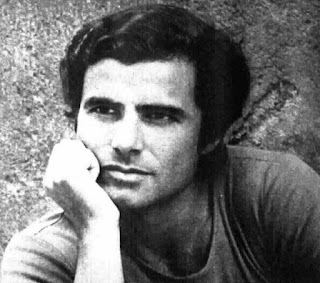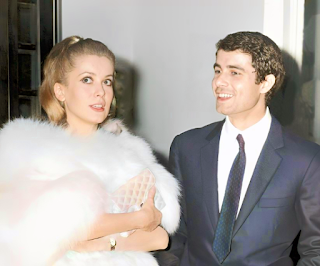Starred in sumptuous French musical and TV adaptation of literary classic
The actor Nino Castelnuovo, best known for playing opposite a young Catherine Deneuve in a Palme d’Or-winning French musical and as the star of a celebrated TV adaptation of Alessandro Manzoni’s classic novel I promessi sposi (The Betrothed), died on this day in 2021 at the age of 84.
Nino Castelnuovo worked with some of Italy's
most famous 'golden age' directors
Castelnuovo’s talent came to the fore during a golden age of Italian cinema, working with leading directors such as Luchino Visconti, Vittorio De Sica, Pietro Germi, Luigi Comencini and Pier Paolo Pasolini, and starring opposite such luminaries as Alberto Sordi, Monica Vitti and Claudia Cardinale.
Yet it was the visually beautiful, deeply sentimental French musical, Le parapluies de Cherbourg - The Umbrellas of Cherbourg - that catapulted him to fame in 1964, five years after his screen debut.
Directed by Jacques Demy, the musical, in which the dialogue is entirely sung (although by voice dubbers rather than the actors appearing on screen), Castelnuovo played the handsome Guy, a mechanic, who is in love with Deneuve’s character, Geneviève, who works in her mother’s umbrella shop.
Their romance is interrupted when Guy is called up to serve in the Algerian War. Geneviève gives birth to their child while Guy is away but they lose touch. When they meet again, six years later, they are both married to other people, their lives having taken very different courses. An affecting tale, The Umbrellas of Cherbourg won the Palme d’Or at Cannes and was nominated for five Academy Awards.
 |
| Catherine Deneuve and Nino Castelnuovo arrive at a promotional event for The Umbrellas of Cherbourg |
Nino worked at different times as a mechanic and a painter. An enthusiastic cinema-goer, he idolised Fred Astaire, which prompted him to take lessons in gymnastics and dancing. After moving to Milan at the age of 19, he studied drama at the Piccolo Teatro, presided over by the director Giorgio Strehler.
His first screen appearance came via a bit part in a film titled The Virtuous Bigamist in 1956, but his first credited role was in the 1959 thriller Un maledetto imbroglio, directed by Germi, based on Carlo Emilio Gadda’s crime novel, which was titled in English as That Awful Mess on Via Merulana. The film was shown in America as The Facts of Murder.
The following year he starred with Alain Delon in Visconti’s acclaimed drama Rocco and His Brothers and alongside the actor-director Pasolini in The Hunchback of Rome.
The Umbrellas of Cherbourg won him gushing reviews, yet where Deneuve’s career took off internationally after the film’s release, Castelnuovo fared less well. He was never short of parts, going on to make more than 50 films, yet Italian cinema audiences in particular were slow to warm to him.
 |
| Castelnuovo with Claudia Cardinale in a scene from his first credited movie, Un maledetto imbroglio |
The revised, definitive version published in 1842 has become the most widely-read novel in the Italian language, studied by virtually every Italian secondary school student and regarded by Italian scholars as a literary masterpiece on a par with Dante’s Divine Comedy.
By coincidence, Manzoni places Renzo and Lucia, the couple at the centre of the novel’s storyline, in a village just outside Lecco, where their story begins. The novel is notable for its description of 17th century Milan during a major outbreak of plague. Rai’s adaptation won much praise from critics and Castelnuovo enjoyed a surge of popularity that won him an audience with Pope Paul VI, among other things.
Thereafter, Castelnuovo became a familiar face in TV dramas both in Italy and in other European countries, although he continued to make films and was keen to work in theatre, too. He performed in several stage productions of the works of Carlo Goldoni, the 18th century Venetian playwright, and returned to the cinema in 1996 when director Anthony Minghella cast him as an archaeologist in the Oscar-winning The English Patient.
Despite suffering problems with his eyesight due to glaucoma, Castelnuovo continued working, mainly on television, into his late 70s. He suffered two personal tragedies, losing both his brothers. In 1976, Pierantonio died after being beaten up by a group of revellers at a festival, while Clemente was killed in a car accident in 1994.
Nino himself died in hospital in Rome after a long period of ill health. He was survived by his wife, the actress Maria Cristina Di Nicola, and a son, Lorenzo, from a previous relationship.
Travel tip:
Piazza XX Settembre in the Lombardy town of
Lecco, looking towards the Basilica di San Nicolò
Lecco, where Nino Castelnuovo was born, lies at the end of the south eastern branch of Lago di Como, which is known as Lago di Lecco. The town is surrounded by mountains including Monte Resegone, which has cable-car access to the Piani d’Erna lookout point, and Monte Barro, a regional park area that contains the remains of a fifth-century settlement and the Costa Perla birdwatching station. In the centre of Lecco, the Basilica di San Nicolò, with its neo-Gothic bell tower, is a notable attraction, while the town makes much of it being the childhood home of Alessandro Manzoni, who chose it as the home of his betrothed lovers, Renzo and Lucia, in I promessi sposi. The historic fishermen’s quarter of Pescarenico, which features in the book, has a number of restaurants that make it well worth a visit.
Travel tip:
Bellagio is one of many pretty towns dotted
around the shores of Lago di Como
Lago di Como - Lake Como - the third largest lake in Italy after Garda and Maggiore, has been a popular retreat for aristocrats and the wealthy since Roman times, and remains a popular tourist destination. Its many lakeside villas include the Villa Carlotta, overlooking the lake at Tremezzo, built in the late 18th century as a holiday home for the Clerici family, successful silk merchants, the Villa Olmo in Como, built for the marquis Innocenzo Odescalchi, and Villa d'Este, in Cernobbio, now a luxury hotel and, between 1816 and 1817, home to Caroline of Brunswick, estranged wife of the Prince of Wales and later Queen Consort of King George IV of the United Kingdom. Numerous pretty towns along the shores of the lake, which covers an area of 146 sq km (56 sq miles), include Bellagio, Menaggio and Varenna.
Also on this day:
1610: The birth of Francesco I d’Este, Duke of Modena
1620: The birth of composer Isabella Leonarda
1825: The birth of painter Giovanni Fattori
1925: The birth of novelist and screenwriter Andrea Camilleri





